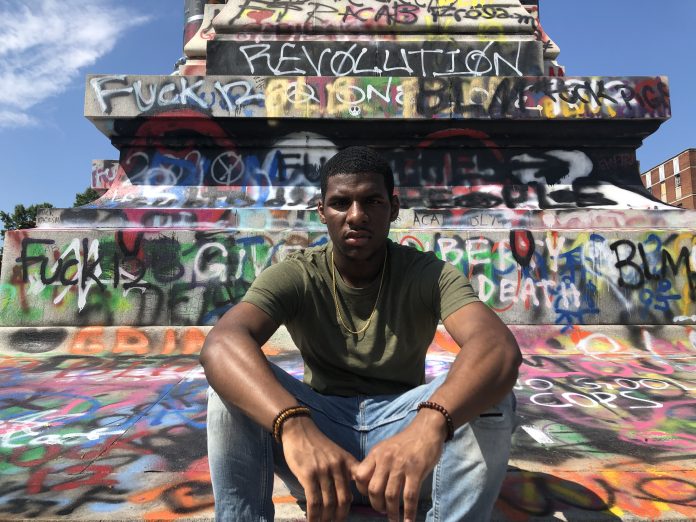June 19, Alton Coston III ‘23 walked up to the Robert E. Lee Memorial in his native Richmond, Va. Following weeks of protest against police brutality and systemic racism, the monument was covered with a rainbow of spray-painted messages from the statue’s base to its concrete floor.
“I remember first walking on the grounds of the Lee monument and seeing the spray paint, the writings and the drawings and thinking ‘this is what democracy looks like,’” Coston said. “This is what ‘we the people’ actually means, as opposed to when it was first drafted in the Constitution. When people were voicing their opinions on what was happening nationally, as well as in their own backyard in Richmond, it made me proud.”
Juneteenth — or June 19 — is the holiday that commemorates the day in which the last enslaved people in the United States were informed of their liberation. Being from Richmond, Coston has driven past Monument Avenue a number of times in his life. He had the opportunity to speak at the site, in front of a huge crowd, in a moment he called “nothing short of sensational,” as he realized what this experience could mean for the legacy of his ancestors.
Civil rights advocacy has been an integral part of Coston’s life for as long as he can remember. This summer, he worked as a policy advocacy intern at the American Civil Liberties Union of Virginia. He was able to tackle some of the very issues that he advocated for as he spoke in front of the Robert E. Lee memorial on Juneteenth. A public policy and Africana studies double major, Coston is always on the lookout for opportunities to further his understanding of advocacy work and the legislative process. What started as a Google search last winter became what he refers to as the greatest internship experience he has ever had.
Like most internship programs operating in a pandemic, Coston had to work remotely. Equipped with a laptop given to him by his office and an ACLU email address, Coston worked in the state legislative process, analyzed the Virginia prison system and Richmond police force and even wrote several blog posts for the ACLU of Virginia website. One of the most eye-opening projects he worked on involved researching the COVID-19 pandemic’s impact on Virginia’s prisons.
“I was able to understand Virginia’s prison and jail system a lot more comprehensively than I had before,” Coston said. “COVID-19 was worse in prisons and jails than it was out in the real world, yet people in prisons and jails can’t do anything about it.”
Coston said that his office set up a hotline where family members could call in and describe to him and his colleagues the conditions their incarcerated family members lived in.
“The graphic things that we heard and received were absolutely astonishing,” Coston said. “One of the quotes I won’t forget was someone telling us, ‘I’m here to serve my time, I’m not in here to die.’”
His time at the ACLU of Virginia showed him how much influence third-party organizations can have in the policy advocacy process, especially in the area of civil rights. As a public policy student, being able to understand the political process in a hands-on manner was an unforgettable experience for him.
“My internship allowed me to see things that the average citizen wouldn’t. I did not realize the ACLU of Virginia had that much power or authority,” Coston said. “I saw just how much authority the ACLU of Virginia had regarding civil and first amendment cases and how much power saying ‘we’re from the ACLU’ has, especially in prisons.”
As his internship came to an end, he regarded his colleagues as mentors. He learned that he did not have to have a legal background to fight for civil rights causes, just the drive and passion for advocating for policies that ensure them. At 19, he was the youngest intern in the office, but he believed that his age was a great asset to the work he did over the summer — especially when he remembered the importance of young people in civil rights advocacy.
“I was the youngest person on each and every call, but in the same vein, I was also the person that inspired the most,” Coston said. “I’m a trailblazer. Every political movement and protest is started by young people. That passion that is found in young people, I believe the ACLU of Virginia saw in me, and that is part of the reason why I believe I was selected.”
Coston said that his work with the ACLU was emotionally heavy but worth it all the same. Between the Black Lives Matter protests in his hometown and learning more about the injustices faced by incarcerated people in the commonwealth, Coston said that working at the ACLU as a Black man could at times be conflicting, but he knew that advocacy work was worth it for the impact it could have.
“Oftentimes, even at the ACLU of Virginia, I was the only Black person in the room,” Coston said. “In the same vein you had people who were true allies and who weren’t doing this work for performative reasons. You had people who were truly knowledgeable of the issues that Black and brown people face. That’s what drove me to continue to show up. I am able to enlighten people on my experiences, while people with legal backgrounds had the tools to help Black and brown people.”

